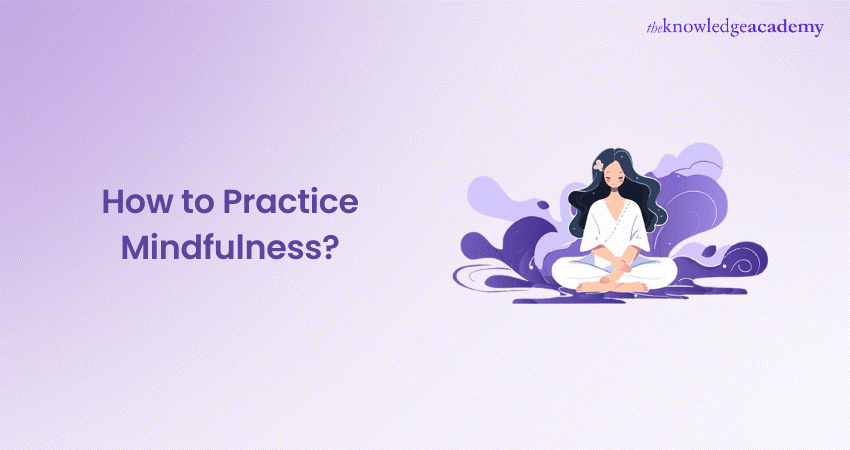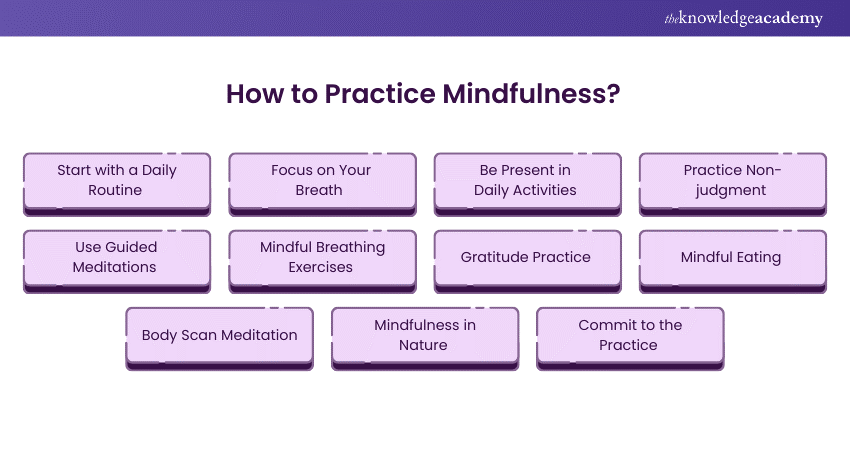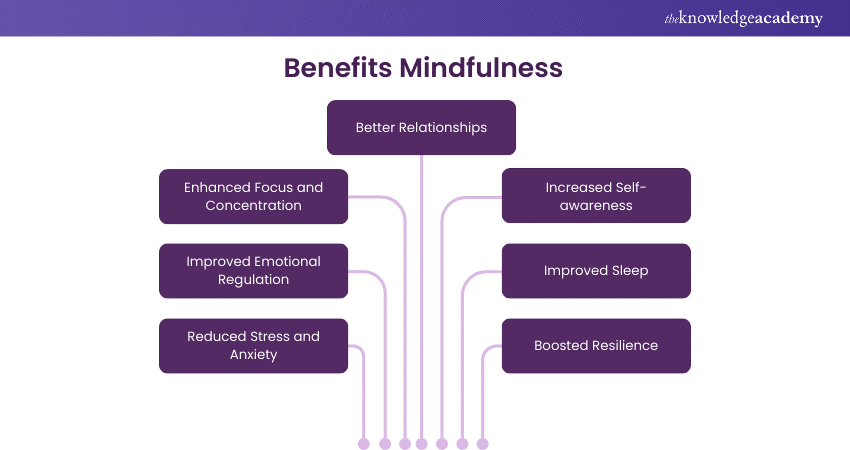We may not have the course you’re looking for. If you enquire or give us a call on + 800 908601 and speak to our training experts, we may still be able to help with your training requirements.
Training Outcomes Within Your Budget!
We ensure quality, budget-alignment, and timely delivery by our expert instructors.

In the hustle and bustle of everyday life, finding peace and clarity might feel like an impossible task. But what if there was a simple way to stay calm and focused, no matter what life throws at you? Mindfulness offers exactly that! It is a powerful practice that helps you live in the present moment.
This blog explores How to Practice Mindfulness and shows you practical steps to integrate it into your daily life. Whether you're new to Mindfulness or looking to deepen your practice, discover how Mindfulness can transform your life by reducing stress, enhancing well-being, and bringing balance to your mind and body.
Table of Contents
1) What is Mindfulness?
2) Mindfulness Benefits
3) How to Practice Mindfulness?
a) Start with a Daily Routine
b) Focus on Your Breath
c) Be Present in Daily Activities
d) Practice Non-judgment
e) Use Guided Meditations
4) Conclusion
What is Mindfulness?
Mindfulness is the art of paying full attention to the present moment without judgment. It involves being aware of your thoughts and surroundings without getting caught up in them. Rather than dwelling on the past or worrying about the future, Mindfulness encourages you to focus on the here and now.
At its core, Mindfulness is about observing your emotions with a sense of curiosity and openness. It’s about acknowledging whatever is happening in the present moment without trying to change or avoid it. This simple practice can help you gain insight into your own mind and create a sense of awareness.
Mindfulness Benefits
Here are some of the key advantages:
a) Reduced Stress and Anxiety: Mindfulness can help reduce stress by encouraging you to focus on the present moment rather than getting overwhelmed by worries about the past or future. By becoming aware of your thoughts, you can respond to stressors with greater calmness and clarity.
b) Improved Emotional Regulation: Mindfulness allows you to observe your emotions without immediately reacting to them. This can help you respond to tough situations more thoughtfully and effectively rather than being driven by impulsive reactions.
c) Enhanced Focus and Concentration: Regular Mindfulness practice can improve your ability to stay focused. By training your mind to be present, you’ll find it easier to pay attention to tasks and reduce distractions.
d) Better Relationships: Mindfulness can enhance your relationships by improving your ability to listen and communicate with others. When you’re fully present in your interactions, you’re more likely to connect with others on a deeper level.
e) Increased Self-awareness: Mindfulness encourages you to explore your thoughts, feelings, and behaviours without judgment. This self-awareness can help you gain a better understanding of yourself and make positive changes in your life.
f) Improved Sleep: Practicing Mindfulness can help you relax, making it easier to fall asleep. By calming your mind before bedtime, you can improve the quality of your sleep.
g) Boosted Resilience: Mindfulness can increase your resilience by helping you develop a greater sense of acceptance and adaptability. When faced with challenges, you’ll be better equipped to navigate them with grace and resilience.
Learn how to tackle mental health problems with our Mental Health and Wellbeing Training – Join today!
How to Practice Mindfulness?
Practising Mindfulness can be a great way to bring more peace into your daily life. Here are some practical steps to get you started:

Start with a Daily Routine
Establishing a daily routine for Mindfulness practice is crucial. Choose a specific time each day, such as in the morning or before bed, to practice. Consistency helps in forming a habit and integrating Mindfulness into your life. Even a few minutes each day can make a significant difference. Over time, this routine can become a cherished part of your day.
Focus on Your Breath
Start by sitting comfortably in a calm place. Close your eyes and take a few deep breaths, paying attention to how the air feels as it goes in and out of your body. If your mind starts to wander, gently return your focus to your breathing. This practice can help calm your mind and thoughts.
Be Present in Daily Activities
Mindfulness can be practised during everyday activities like eating, walking, or even washing dishes. Pay attention to the sensations and sounds involved in these tasks. For example, when eating, notice the texture and taste of each bite. This practice helps you stay grounded in that moment. It can also make mundane tasks enjoyable and meaningful.
Practice Non-judgment
When practising Mindfulness, it’s important to observe your thoughts and feelings without judgment. Acknowledge whatever comes to mind without labelling it as good or bad. If your mind wanders, gently guide it back to the present moment. This non-judgmental awareness can help reduce stress and increase self-compassion. Over time, it can lead to a more balanced and peaceful mindset.
Use Guided Meditations
Guided meditations are a great tool, especially for beginners. They provide structure and can help you stay focused during your practice. Many online resources offer a variety of guided sessions, ranging from a few minutes to an hour. These sessions often include instructions on breathing, visualisation, and relaxation techniques. Regular use of guided meditations can deepen your Mindfulness practice.
Mindful Breathing Exercises
Set aside a few minutes each day for mindful breathing exercises. Sit comfortably and take slow, deep breaths, paying attention to the sensation of air moving in and out of your body. Notice how your body feels with each breath. This practice can help decrease stress and increase your awareness of the present moment. It’s a powerful way to cultivate Mindfulness.
Gratitude Practice
Spend several minutes of your day engaging in some breathing exercises to help you reduce the level of stress in your body. Relax and sit comfortably and let your breath be slow and deep, try to focus on the breathing that goes in and out of your body. Pay attention to how your body reacts to each breath.
Practice can be useful to minimise stress and enhance your consciousness of the current moment. This is actually one of the best ways to nurture Mindfulness.
Mindful Eating
When eating, take the time to savour each bite. Pay attention to the taste and smell of your food. Eat slowly and chew thoroughly, noticing the sensations in your mouth. This practice can enhance your eating experience and help you stay present. It can also foster healthier eating habits and improve digestion.
Body Scan Meditation
It involves focusing on different parts of your body, from your toes to your head. Lie down or sit comfortably and close your eyes. Slowly bring your attention to each part of your body, noticing any sensations or tension. This practice can help you become more aware of your body and release physical stress. It’s a great way to relax and connect with your body.
Mindfulness in Nature
Spending time in nature can be a refreshing way to practice Mindfulness. Take a walk in a park, garden, or any natural setting. Observe the sounds and smells around you. Notice the feeling of the ground beneath your feet and the air on your skin. This practice can help you feel more connected to the world and enhance your sense of well-being.
Commit to the Practice
Commitment is key to gaining the benefits of Mindfulness. Set realistic goals and be patient with yourself. It may take time to see significant changes, but regular practice can lead to improvements in your mental and Emotional Well-being. Stay dedicated and open to the process.
Improve your emotional awareness with our Mindfulness Training – Join today!
Conclusion
Mindfulness is a practice that can change your life by helping you become more present, aware, and connected. By learning How to Practice Mindfulness daily, you can reduce stress, improve emotional well-being, and enhance your overall quality of life. Mindfulness is a journey, not a destination. Start small, be patient, and enjoy discovering the beauty of the present moment. Embrace practices like mindful breathing, Meditation, and journaling to experience its positive impact on your mind, body, and soul.
Learn various techniques to increase mental strength with our Handle Stress and Develop Your Resilience Training - Join today!
Frequently Asked Questions

To remain conscious during stressful circumstances, pause for a minute, take several breaths and concentrate on the current events without dwelling upon the past or the future. Use Mindfulness strategies such as taking a timeout to meditate or experiencing grounding to keep you relaxed.

Mindfulness is generally applicable and appropriate for everyone and can be readily personalized. However, in case of some other health concern like a history of traumatic experience or psychological disorders, it is wise to seek advice from a doctor.

The Knowledge Academy takes global learning to new heights, offering over 30,000 online courses across 490+ locations in 220 countries. This expansive reach ensures accessibility and convenience for learners worldwide.
Alongside our diverse Online Course Catalogue, encompassing 17 major categories, we go the extra mile by providing a plethora of free educational Online Resources like News updates, Blogs, videos, webinars, and interview questions. Tailoring learning experiences further, professionals can maximise value with customisable Course Bundles of TKA.

The Knowledge Academy’s Knowledge Pass, a prepaid voucher, adds another layer of flexibility, allowing course bookings over a 12-month period. Join us on a journey where education knows no bounds.

The Knowledge Academy offers various Mental Health Courses, including Mindfulness Training, Mental Health and Wellbeing Training, and Positive Psychology Course. These courses cater to different skill levels, providing comprehensive insights into Mindfulness.
Our Health & Safety Blogs cover a range of topics related to Mental Health, offering valuable resources, best practices, and industry insights. Whether you are a beginner or looking to advance your Health and Safety knowledge, The Knowledge Academy's diverse courses and informative blogs have you covered.
Upcoming Health & Safety Resources Batches & Dates
Date
 Mindfulness Training
Mindfulness Training
Fri 27th Dec 2024
Fri 24th Jan 2025
Fri 21st Mar 2025
Fri 2nd May 2025
Fri 27th Jun 2025
Fri 29th Aug 2025
Fri 3rd Oct 2025
Fri 5th Dec 2025







 Top Rated Course
Top Rated Course




 If you wish to make any changes to your course, please
If you wish to make any changes to your course, please


